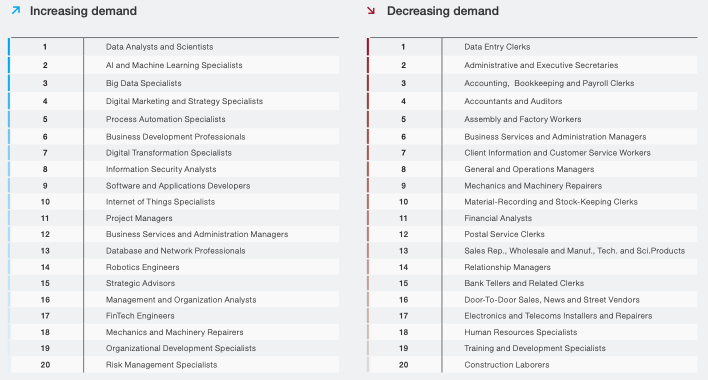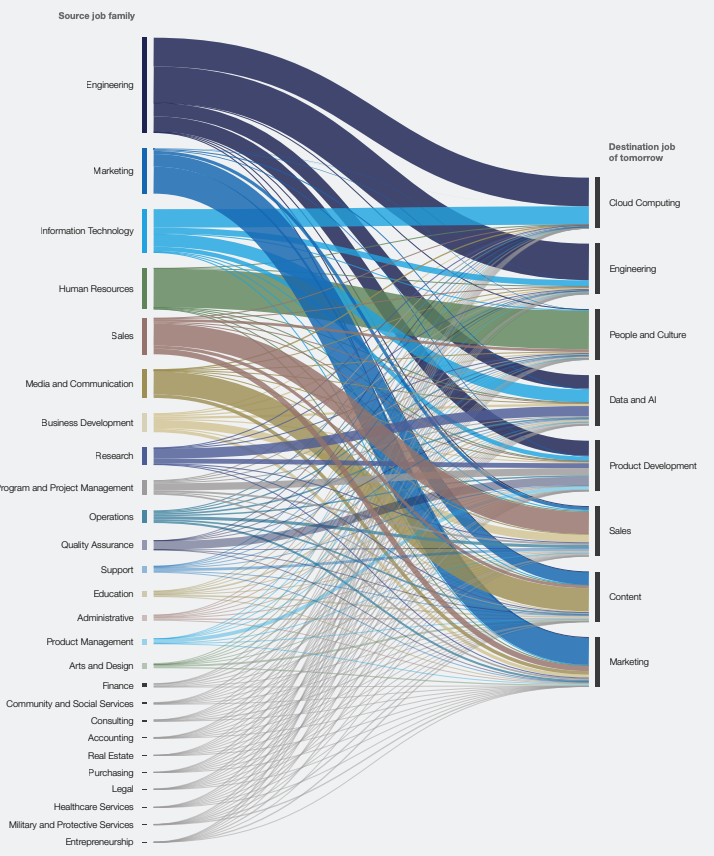
These are the jobs of tomorrow

The future looks bright if you are a data analyst, a scientist, a robotics engineer, a business development professional or an artificial intelligence or big data-specialist. These are amongst the top twenty roles that are increasing in demand across all industries, according to the World Economic Forum Future of Jobs Report.
The report claims that an estimated 85 million jobs may be displaced by a shift in labour between humans and machines by 2025. Roles for which demand is decreasing according to the World Economic Forum include data entry clerks, accountants, auditors and executive secretaries. Many of these roles are being rapidly replaced by new technologies and by automation.

Whilst many roles will diminish as a result of the technology revolution, the Future of Jobs Report also predicts that 97 million new roles may emerge, and with them new opportunities. Younger workers in particular may have a wider range of interesting career options to choose from, and may even be able to climb the career ladder much faster when pioneering brand new roles.
For those seeking to make a career change before their current role becomes obsolete, data suggests that newer-emerging professions such as Data and AI, Product Development and Cloud Computing will be the easiest of the emerging career fields to ‘break in’ to, because they typically do not require a ‘perfect’ skills match from a prior occupation.
Data suggests that engineers might make an easy transition into cloud computing, and that sales people and marketeers will be able to easily transfer their skills into similar roles within the newly-emerging industries. Those of an entrepreneurial disposition will find themselves cast across a diverse spectrum of new opportunities; whilst researchers may become AI specialists.

Unsurprisingly, amongst the top skills that the Future of Jobs Report believes will be needed by 2025 are analytical thinking, innovation, complex problem solving, critical thinking and technology. Also within the top ‘future skills’ are emotional intelligence, persuasion and negotiation; thus showing that human interaction will remain a part of everyday work.
The oncoming changes will not come as a surprise to those who are already in the workforce. Data from online learning provider Coursera reveals a significant increase in demand for personal development courses during 2020. Those in employment are placing much larger emphasis on personal development, whilst those who are unemployed have placed greater emphasis on learning digital skills such as data analysis, computer science and IT which are of relevance for newly-emerging jobs in Engineering, Cloud Computing, Data and AI.
Unfortunately whilst the disruption of the global pandemic of 2020 and 2021 has accelerated many of the technological trends which are driving big changes in the shape and nature of work, the same disruption has also slowed jobs growth. For the first time in 2020, job creation started to lag behind job destruction, which will affect disadvantaged workers with particular ferocity.
The Future of Work Report says that as unemployment figures inevitably rise, it will become essential that the public and private sector provide support for retraining to displaced and at-risk workers as they navigate the paths towards new opportunities and the ‘jobs of tomorrow’. Addressing the current challenges posed by COVID-19, in tandem with the disruption posed by technological change, will require new innovation for the benefit of workers everywhere.